Microeconomics Assignment 2: Demand Elasticity Interview Analysis
VerifiedAdded on 2021/04/16
|5
|1178
|164
Homework Assignment
AI Summary
This Microeconomics assignment presents an interview with a student who migrated from the Philippines to Canada, exploring the concept of elasticity of demand in a real-life scenario. The interview delves into the student's consumption patterns, expenditure, and standard of living in both countries, comparing prices of goods and services, housing options, transportation, and food items like apples, milk, and meat. The student discusses how their purchasing power and consumption habits have changed, highlighting the affordability of basic commodities in Canada compared to the Philippines, while also noting the higher cost of certain items like meat. The assignment aims to analyze how these differences affect the student's purchasing decisions and overall economic behavior, providing insights into how demand elasticity varies across different geographical locations.
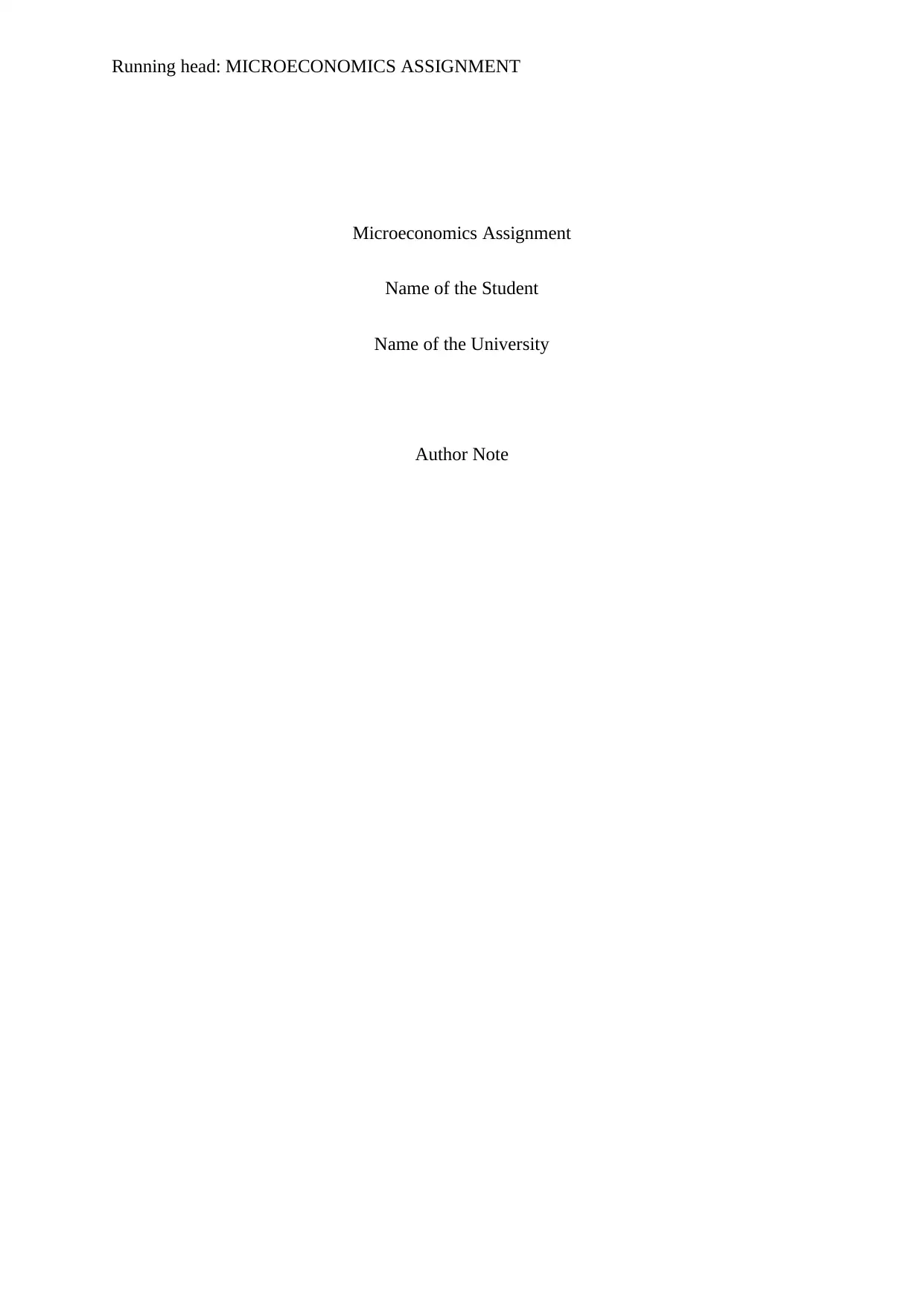
Running head: MICROECONOMICS ASSIGNMENT
Microeconomics Assignment
Name of the Student
Name of the University
Author Note
Microeconomics Assignment
Name of the Student
Name of the University
Author Note
Paraphrase This Document
Need a fresh take? Get an instant paraphrase of this document with our AI Paraphraser
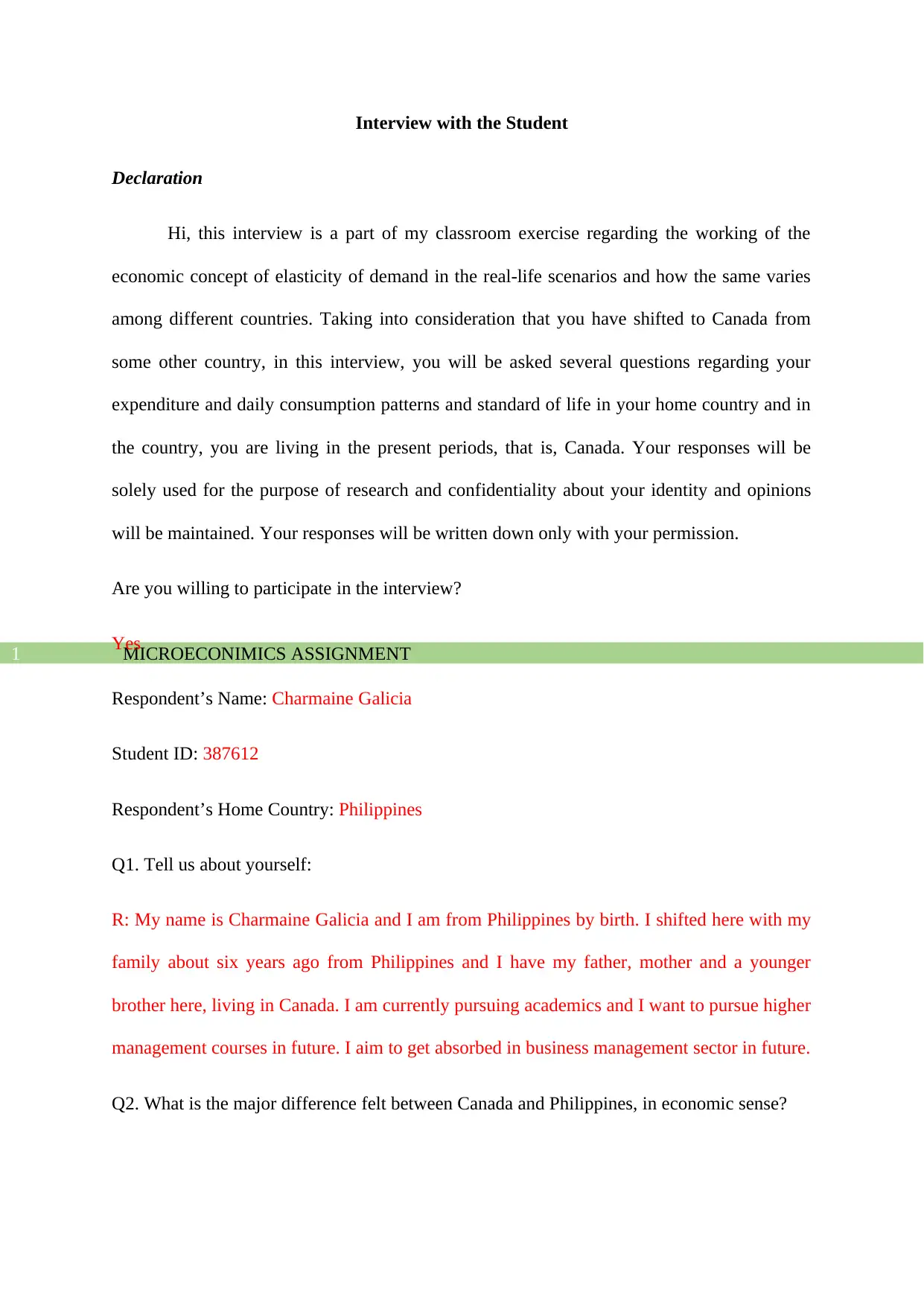
MICROECONIMICS ASSIGNMENT1
Interview with the Student
Declaration
Hi, this interview is a part of my classroom exercise regarding the working of the
economic concept of elasticity of demand in the real-life scenarios and how the same varies
among different countries. Taking into consideration that you have shifted to Canada from
some other country, in this interview, you will be asked several questions regarding your
expenditure and daily consumption patterns and standard of life in your home country and in
the country, you are living in the present periods, that is, Canada. Your responses will be
solely used for the purpose of research and confidentiality about your identity and opinions
will be maintained. Your responses will be written down only with your permission.
Are you willing to participate in the interview?
Yes
Respondent’s Name: Charmaine Galicia
Student ID: 387612
Respondent’s Home Country: Philippines
Q1. Tell us about yourself:
R: My name is Charmaine Galicia and I am from Philippines by birth. I shifted here with my
family about six years ago from Philippines and I have my father, mother and a younger
brother here, living in Canada. I am currently pursuing academics and I want to pursue higher
management courses in future. I aim to get absorbed in business management sector in future.
Q2. What is the major difference felt between Canada and Philippines, in economic sense?
Interview with the Student
Declaration
Hi, this interview is a part of my classroom exercise regarding the working of the
economic concept of elasticity of demand in the real-life scenarios and how the same varies
among different countries. Taking into consideration that you have shifted to Canada from
some other country, in this interview, you will be asked several questions regarding your
expenditure and daily consumption patterns and standard of life in your home country and in
the country, you are living in the present periods, that is, Canada. Your responses will be
solely used for the purpose of research and confidentiality about your identity and opinions
will be maintained. Your responses will be written down only with your permission.
Are you willing to participate in the interview?
Yes
Respondent’s Name: Charmaine Galicia
Student ID: 387612
Respondent’s Home Country: Philippines
Q1. Tell us about yourself:
R: My name is Charmaine Galicia and I am from Philippines by birth. I shifted here with my
family about six years ago from Philippines and I have my father, mother and a younger
brother here, living in Canada. I am currently pursuing academics and I want to pursue higher
management courses in future. I aim to get absorbed in business management sector in future.
Q2. What is the major difference felt between Canada and Philippines, in economic sense?
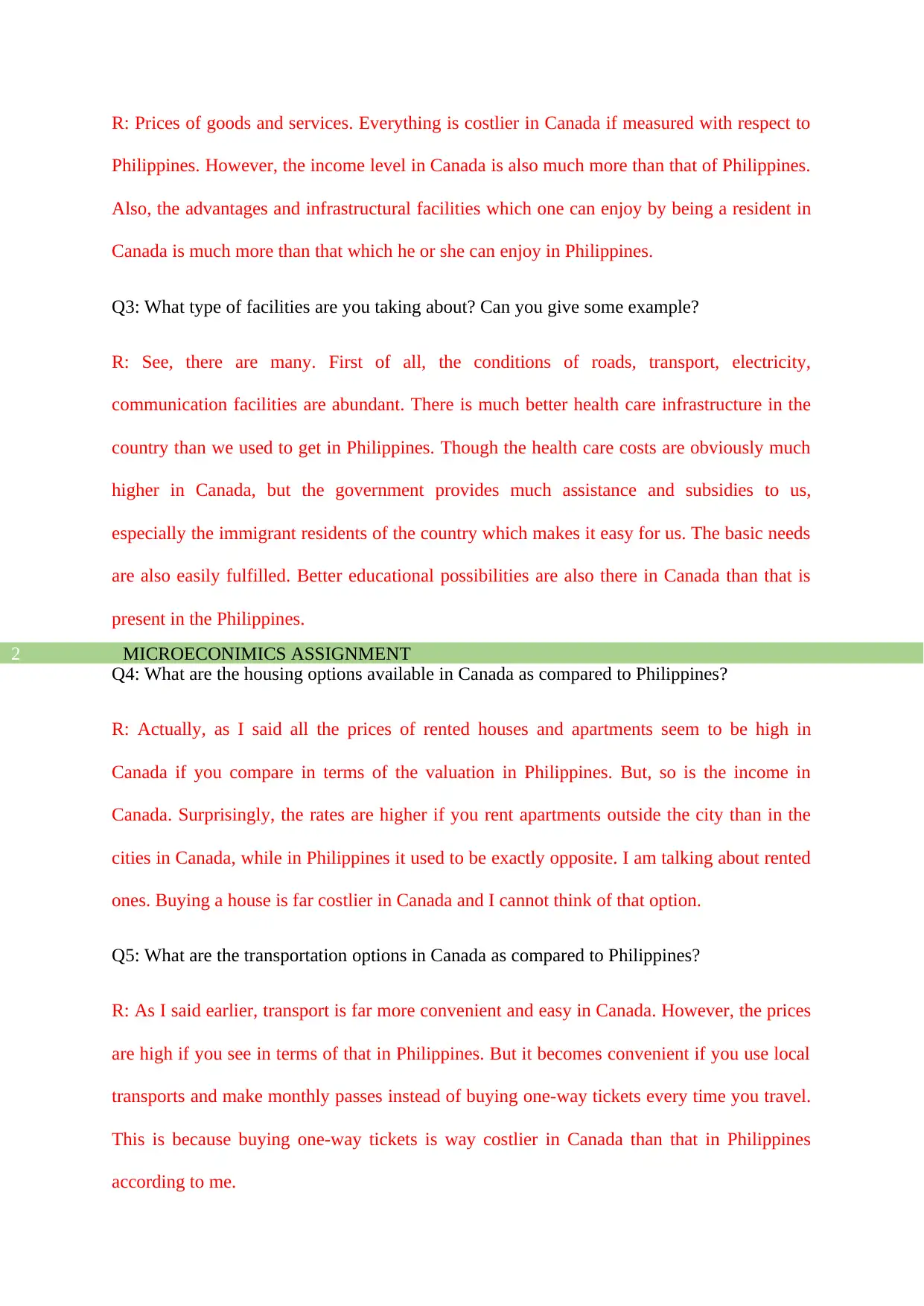
MICROECONIMICS ASSIGNMENT2
R: Prices of goods and services. Everything is costlier in Canada if measured with respect to
Philippines. However, the income level in Canada is also much more than that of Philippines.
Also, the advantages and infrastructural facilities which one can enjoy by being a resident in
Canada is much more than that which he or she can enjoy in Philippines.
Q3: What type of facilities are you taking about? Can you give some example?
R: See, there are many. First of all, the conditions of roads, transport, electricity,
communication facilities are abundant. There is much better health care infrastructure in the
country than we used to get in Philippines. Though the health care costs are obviously much
higher in Canada, but the government provides much assistance and subsidies to us,
especially the immigrant residents of the country which makes it easy for us. The basic needs
are also easily fulfilled. Better educational possibilities are also there in Canada than that is
present in the Philippines.
Q4: What are the housing options available in Canada as compared to Philippines?
R: Actually, as I said all the prices of rented houses and apartments seem to be high in
Canada if you compare in terms of the valuation in Philippines. But, so is the income in
Canada. Surprisingly, the rates are higher if you rent apartments outside the city than in the
cities in Canada, while in Philippines it used to be exactly opposite. I am talking about rented
ones. Buying a house is far costlier in Canada and I cannot think of that option.
Q5: What are the transportation options in Canada as compared to Philippines?
R: As I said earlier, transport is far more convenient and easy in Canada. However, the prices
are high if you see in terms of that in Philippines. But it becomes convenient if you use local
transports and make monthly passes instead of buying one-way tickets every time you travel.
This is because buying one-way tickets is way costlier in Canada than that in Philippines
according to me.
R: Prices of goods and services. Everything is costlier in Canada if measured with respect to
Philippines. However, the income level in Canada is also much more than that of Philippines.
Also, the advantages and infrastructural facilities which one can enjoy by being a resident in
Canada is much more than that which he or she can enjoy in Philippines.
Q3: What type of facilities are you taking about? Can you give some example?
R: See, there are many. First of all, the conditions of roads, transport, electricity,
communication facilities are abundant. There is much better health care infrastructure in the
country than we used to get in Philippines. Though the health care costs are obviously much
higher in Canada, but the government provides much assistance and subsidies to us,
especially the immigrant residents of the country which makes it easy for us. The basic needs
are also easily fulfilled. Better educational possibilities are also there in Canada than that is
present in the Philippines.
Q4: What are the housing options available in Canada as compared to Philippines?
R: Actually, as I said all the prices of rented houses and apartments seem to be high in
Canada if you compare in terms of the valuation in Philippines. But, so is the income in
Canada. Surprisingly, the rates are higher if you rent apartments outside the city than in the
cities in Canada, while in Philippines it used to be exactly opposite. I am talking about rented
ones. Buying a house is far costlier in Canada and I cannot think of that option.
Q5: What are the transportation options in Canada as compared to Philippines?
R: As I said earlier, transport is far more convenient and easy in Canada. However, the prices
are high if you see in terms of that in Philippines. But it becomes convenient if you use local
transports and make monthly passes instead of buying one-way tickets every time you travel.
This is because buying one-way tickets is way costlier in Canada than that in Philippines
according to me.
⊘ This is a preview!⊘
Do you want full access?
Subscribe today to unlock all pages.

Trusted by 1+ million students worldwide
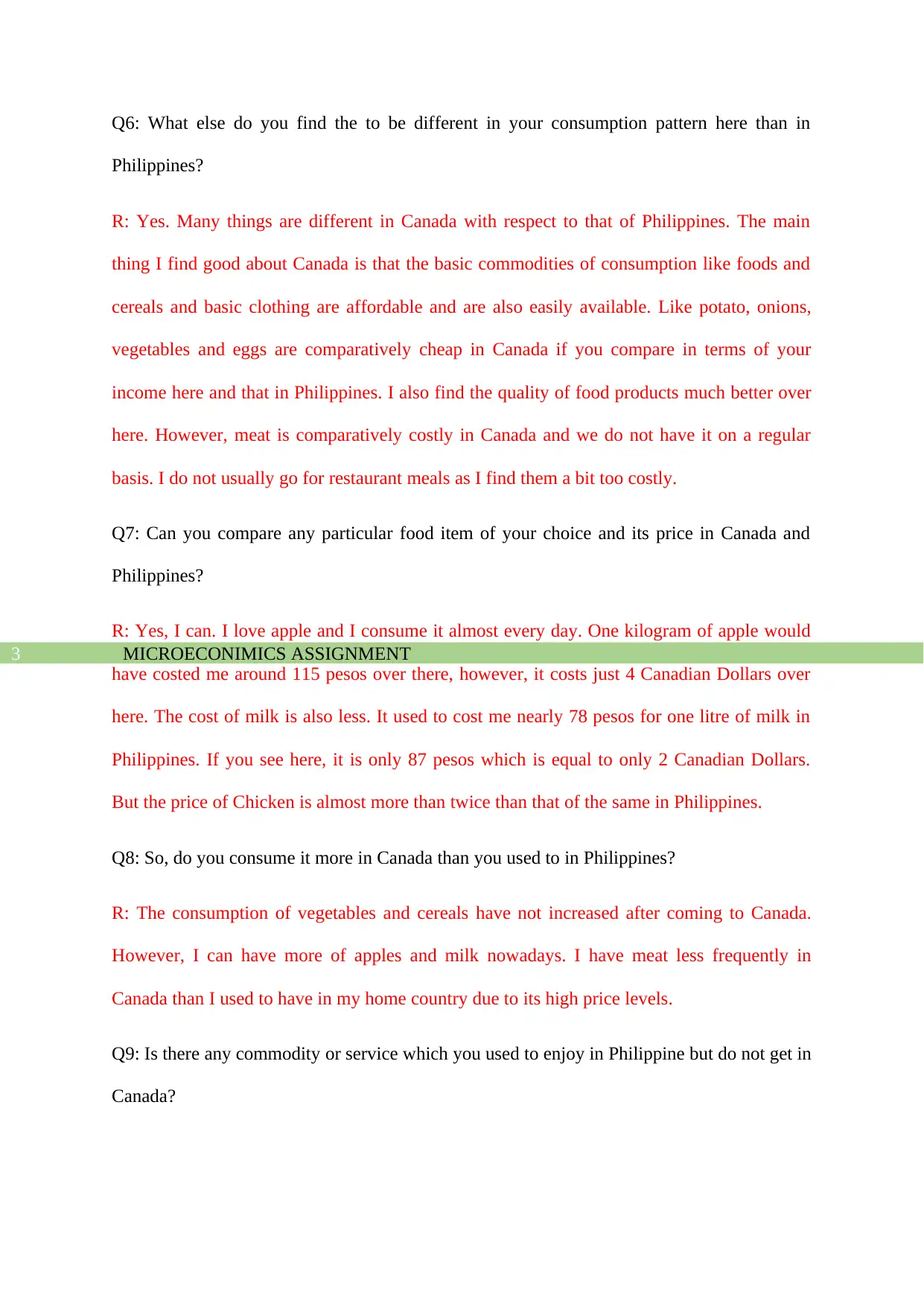
MICROECONIMICS ASSIGNMENT3
Q6: What else do you find the to be different in your consumption pattern here than in
Philippines?
R: Yes. Many things are different in Canada with respect to that of Philippines. The main
thing I find good about Canada is that the basic commodities of consumption like foods and
cereals and basic clothing are affordable and are also easily available. Like potato, onions,
vegetables and eggs are comparatively cheap in Canada if you compare in terms of your
income here and that in Philippines. I also find the quality of food products much better over
here. However, meat is comparatively costly in Canada and we do not have it on a regular
basis. I do not usually go for restaurant meals as I find them a bit too costly.
Q7: Can you compare any particular food item of your choice and its price in Canada and
Philippines?
R: Yes, I can. I love apple and I consume it almost every day. One kilogram of apple would
have costed me around 115 pesos over there, however, it costs just 4 Canadian Dollars over
here. The cost of milk is also less. It used to cost me nearly 78 pesos for one litre of milk in
Philippines. If you see here, it is only 87 pesos which is equal to only 2 Canadian Dollars.
But the price of Chicken is almost more than twice than that of the same in Philippines.
Q8: So, do you consume it more in Canada than you used to in Philippines?
R: The consumption of vegetables and cereals have not increased after coming to Canada.
However, I can have more of apples and milk nowadays. I have meat less frequently in
Canada than I used to have in my home country due to its high price levels.
Q9: Is there any commodity or service which you used to enjoy in Philippine but do not get in
Canada?
Q6: What else do you find the to be different in your consumption pattern here than in
Philippines?
R: Yes. Many things are different in Canada with respect to that of Philippines. The main
thing I find good about Canada is that the basic commodities of consumption like foods and
cereals and basic clothing are affordable and are also easily available. Like potato, onions,
vegetables and eggs are comparatively cheap in Canada if you compare in terms of your
income here and that in Philippines. I also find the quality of food products much better over
here. However, meat is comparatively costly in Canada and we do not have it on a regular
basis. I do not usually go for restaurant meals as I find them a bit too costly.
Q7: Can you compare any particular food item of your choice and its price in Canada and
Philippines?
R: Yes, I can. I love apple and I consume it almost every day. One kilogram of apple would
have costed me around 115 pesos over there, however, it costs just 4 Canadian Dollars over
here. The cost of milk is also less. It used to cost me nearly 78 pesos for one litre of milk in
Philippines. If you see here, it is only 87 pesos which is equal to only 2 Canadian Dollars.
But the price of Chicken is almost more than twice than that of the same in Philippines.
Q8: So, do you consume it more in Canada than you used to in Philippines?
R: The consumption of vegetables and cereals have not increased after coming to Canada.
However, I can have more of apples and milk nowadays. I have meat less frequently in
Canada than I used to have in my home country due to its high price levels.
Q9: Is there any commodity or service which you used to enjoy in Philippine but do not get in
Canada?
Paraphrase This Document
Need a fresh take? Get an instant paraphrase of this document with our AI Paraphraser
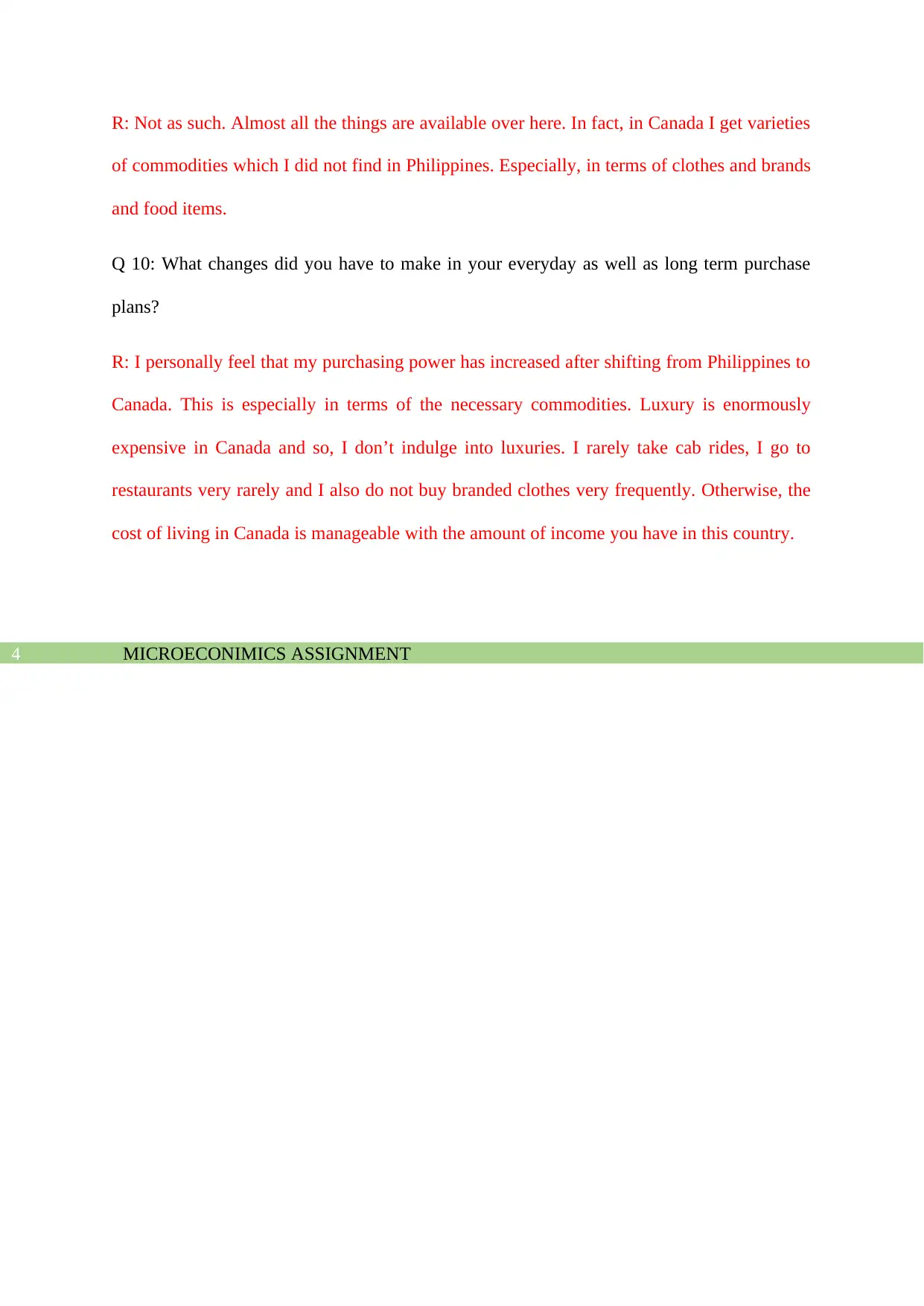
MICROECONIMICS ASSIGNMENT4
R: Not as such. Almost all the things are available over here. In fact, in Canada I get varieties
of commodities which I did not find in Philippines. Especially, in terms of clothes and brands
and food items.
Q 10: What changes did you have to make in your everyday as well as long term purchase
plans?
R: I personally feel that my purchasing power has increased after shifting from Philippines to
Canada. This is especially in terms of the necessary commodities. Luxury is enormously
expensive in Canada and so, I don’t indulge into luxuries. I rarely take cab rides, I go to
restaurants very rarely and I also do not buy branded clothes very frequently. Otherwise, the
cost of living in Canada is manageable with the amount of income you have in this country.
R: Not as such. Almost all the things are available over here. In fact, in Canada I get varieties
of commodities which I did not find in Philippines. Especially, in terms of clothes and brands
and food items.
Q 10: What changes did you have to make in your everyday as well as long term purchase
plans?
R: I personally feel that my purchasing power has increased after shifting from Philippines to
Canada. This is especially in terms of the necessary commodities. Luxury is enormously
expensive in Canada and so, I don’t indulge into luxuries. I rarely take cab rides, I go to
restaurants very rarely and I also do not buy branded clothes very frequently. Otherwise, the
cost of living in Canada is manageable with the amount of income you have in this country.
1 out of 5
Your All-in-One AI-Powered Toolkit for Academic Success.
+13062052269
info@desklib.com
Available 24*7 on WhatsApp / Email
![[object Object]](/_next/static/media/star-bottom.7253800d.svg)
Unlock your academic potential
Copyright © 2020–2026 A2Z Services. All Rights Reserved. Developed and managed by ZUCOL.


